"I Drove All Night" is a song written and composed by American songwriters Billy Steinberg and Tom Kelly and originally intended for Roy Orbison. Orbison recorded the song in 1987, the year before his death, but his version was not released until 1992. Cyndi Lauper recorded the song and released it as a single for her A Night to Remember album. Her version became a top 10 hit on both sides of the Atlantic in 1989 and was also her final top 40 hit on the American pop charts. Lauper still regularly performs the song in her live concerts. The song has also been covered by Canadian singer Celine Dion, whose version topped the Canadian Singles Chart and reached number 7 on the US Adult Contemporary chart in 2003.

Laundry Service is the fifth studio album and first English-language album by Colombian singer-songwriter Shakira, globally released on 13 November 2001 by Epic Records. After her fourth studio album Dónde Están los Ladrones? became a success in Latin America, Spain, the Middle East and the Latin community in the United States, Shakira was encouraged by American singer Gloria Estefan to record songs in English as she believed her friend had the potential to cross over into the English-language pop market. Shakira was hesitant at first, but then decided to learn English well enough to write songs in the language. The title of the album reflects Shakira's views on love and music. It was released as Servicio de Lavandería in Hispanic regions in January 2002. Laundry Service is primarily a pop rock record but it also experiments with Andean music, dance-pop, Middle Eastern music, rock and roll and tango music. The album's theme is love and romance. Every song on it was written and produced by Shakira under the guidance of Emilio Estefan.

"Ojos Así" is a song by Colombian singer Shakira from her fourth studio album, Dónde Están los Ladrones? (1998). Infused with nuances of Arabic pop, the lyrics tell of the singer traveling the world but not having seen eyes like her lover's. It was released as the album's fifth single in October 1999 by Sony Discos. It was written by Shakira, composed and produced by her, Pablo Flores, and Javier Garza. The song was later adapted into English by Gloria Estefan as "Eyes Like Yours" and included on her first English studio album Laundry Service (2001).

"Whenever, Wherever" is the lead single by Colombian singer-songwriter Shakira from her debut English-language studio album, Laundry Service (2001), her fifth overall. It was released on October 2, 2001, by Epic Records. The song was written, composed, and produced by Shakira, with additional musical composition and production from Tim Mitchell, and additional English lyrics written by Gloria Estefan. The song is a mix of Latin music and worldbeat that is heavily influenced by Andean music. In the Spanish version, titled "Suerte", Shakira sings about how fortunate she is to have found her romantic partner. The English lyrics are very similar.

"Don't Bother" is a song performed by Colombian singer-songwriter Shakira, taken from her seventh studio album and second English-language album, Oral Fixation, Vol. 2. The song was released on 11 October 2005, by Epic Records as the lead single from the album. The song was written by Shakira, along with The Matrix and Heather Reid and Leisha Hailey of The Murmurs. It was produced by Shakira with additional co-production by Lester Mendez and Gustavo Cerati. "Don't Bother" is a rock-influenced song in which Shakira assures her former lover that she does not need his sympathy and can move on without him.

"Underneath Your Clothes" is a song by Colombian singer-songwriter Shakira for her third studio album and English-language debut, Laundry Service (2001). The power ballad was the second English-language single released from the album; being released on 11 February 2002. It features lyrics by Shakira with music and production from Shakira and Lester Mendez. Lyrically, the song tells the story of the unconditional love that a woman has for her boyfriend, with lyrics about being worthy of somebody's love.

"Objection (Tango)" is a song by Colombian singer-songwriter Shakira for her fifth studio album and first English-language album Laundry Service (2001). It was the first song Shakira wrote in English after being encouraged by American singer Gloria Estefan to record material in the language. She also produced the track along with Lester Mendez. "Objection (Tango)" musically combines elements of pop rock and tango, and contains instrumentation from the bandoneón and guitar. Through the lyrics of the song, Shakira aims to end a love triangle she is a part of. The song was released as the fourth single from the album on 24 May 2002. A Spanish version of the song, entitled "Te Aviso, Te Anuncio (Tango)" ("I'm Warning You, I'm Telling You"), was also recorded.

Colombian singer and songwriter Shakira has released 11 studio albums, five live albums, two compilation albums, 69 singles and 62 music videos. With 95 million certified records worldwide, she is the highest-selling Colombian artist and the best-selling female Latin artist of all time. She is the only South American artist to peak at number one on the Australian Singles Chart, the UK Singles Chart, and the US Billboard Hot 100. Her singles "Hips Don't Lie" and "Waka Waka ", have achieved sales in excess of ten million units, becoming some of the best-selling singles worldwide.
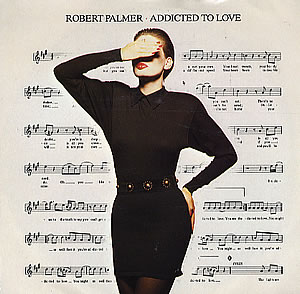
"Addicted to Love" is a song by English rock singer Robert Palmer released in 1986. It is the third song on Palmer's eighth studio album Riptide (1985) and was released as its second single. The single version is a shorter edit of the full-length album version.
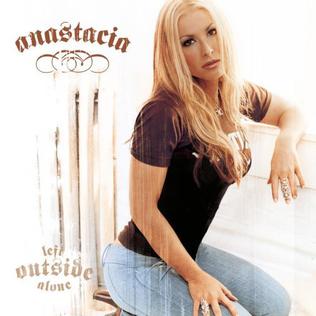
"Left Outside Alone" is a song by American recording artist Anastacia from her third studio album, Anastacia. Written by Anastacia, Dallas Austin, and Glen Ballard, the song details the singer's strained relationship with her estranged father. It was released as the album's lead single on March 15, 2004, to both critical and commercial success. The song peaked at number one in Australia, Austria, Italy, Spain, and Switzerland; number two in Denmark, Germany, Ireland, the Netherlands, and Norway; and number three in the United Kingdom and Hungary, while overall it became the sixth-biggest-selling European single of 2004.

"Hips Don't Lie" is a song by Colombian singer-songwriter Shakira featuring Haitian rapper Wyclef Jean, released by Epic Records in 2006 as the second single from Shakira's seventh studio album, Oral Fixation, Vol. 2 (2005). Shakira and Jean wrote the lyrics and jointly composed the music with additional co-writing by Shakira's percussionist Archie Pena. The song was produced by Shakira and Jean with additional co-production by Jerry Duplessis. "Hips Don't Lie" is a reworking of Jean's earlier single "Dance Like This", therefore it features additional composing credits by Omar Alfanno, Duplessis, Luis Días, and LaTavia Parker. The song incorporates samples from "Amores Como el Nuestro" written by Alfanno, and "Carnaval " written by Días.
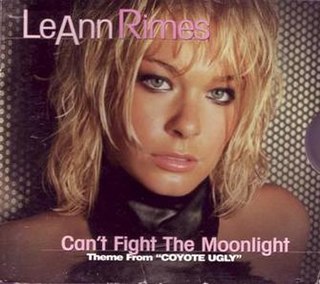
"Can't Fight the Moonlight" is a song written by Diane Warren and performed by American singer LeAnn Rimes. It is the theme song of the film Coyote Ugly. Released as a single on August 22, 2000, the song reached the top 10 in 19 European countries, Australia, Canada, and New Zealand, topping the charts in 12 of these territories; it became Australia's best-selling single of 2001. In the United States, a different mix of the song peaked at number 11 on the Billboard Hot 100 in 2002.
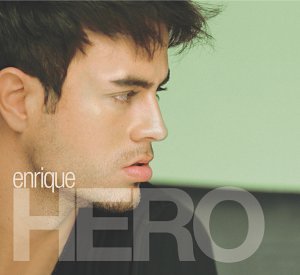
"Hero" is a song by Spanish singer-songwriter Enrique Iglesias from his second English-language studio album Escape (2001). It was written by Iglesias, Paul Barry and Mark Taylor. Interscope Records released the song on 3 September 2001 to a positive critical and commercial reception. To the date the single has sold over 8 million copies worldwide, making it one of the best selling singles of all time.
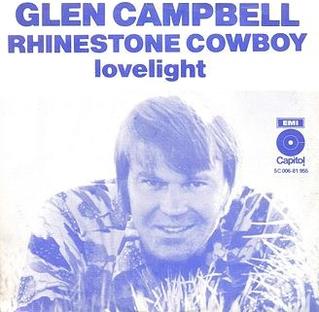
"Rhinestone Cowboy" is a song written by Larry Weiss and recorded by American country music singer Glen Campbell. When released on May 26, 1975, as the lead single and title track from his album Rhinestone Cowboy, it enjoyed huge popularity with both country and pop audiences.

"Boom" is a song by American recording artist Anastacia, which served as the official song of the 2002 FIFA World Cup held in South Korea and Japan. Co-written with and produced by Glen Ballard, it was released as a single on March 20, 2003, by Daylight Records and Epic Records. The song was included on The Official Album of the 2002 FIFA World Cup, as well as on the collectors edition of Anastacia's second studio album Freak of Nature (2001).

"Illegal" is a song recorded by Colombian singer-songwriter Shakira for her seventh studio album, Oral Fixation, Vol. 2 (2005). It was written and produced by Shakira and Lester Mendez and it features Mexican guitarist Carlos Santana. Epic Records released the song as the album's third and final single on 28 August 2006, following the release of "Hips Don't Lie". "Illegal" is a pop and country ballad with lyrics concerning mourning of a past lover complete with an understated vocal performance by Shakira and an electric guitar riff by Santana throughout. It received mixed reviews from music critics, who compared it with Alanis Morissette's material and were mixed towards Santana's contribution.

"Beautiful Liar" is a song by American singer Beyoncé and Colombian singer Shakira. It was written by Beyoncé, Amanda Ghost, Ian Dench, and Stargate members Mikkel S. Eriksen and Tor Erik Hermansen, and produced by Stargate and Beyoncé for the deluxe edition of Beyoncé's second solo studio album, B'Day (2006). The mixing of the song was done by Gustavo Celis. "Beautiful Liar" was released on February 12, 2007, through Columbia Records and Music World Entertainment as the only single from the deluxe edition of the album. A Spanglish mixed version of the song was produced and titled "Bello Embustero".

"Loca" is a song by Dominican singer, El Cata. It achieved mainstream success by Colombian singer-songwriter Shakira, who recorded a cover taken from her ninth studio album, Sale el Sol (2010). It was released by Epic Records as the lead single from the album. The Spanish-language version features Dominican rapper El Cata, and was released on 10 September 2010, while the English-language version features British rapper Dizzee Rascal, and was released on 13 September 2010. It was written and produced by Shakira, with additional songwriting from Edward Bello, Armando Pérez, and Dylan Mills. The song is a Latin pop and merengue track that lyrically describes Shakira's eccentric infatuation with a man. In August 2014, a senior US district judge found "Loca" to have been indirectly plagiarised from "Loca con su Tiguere", a mid-1990s song composed by Dominican songwriter Ramon "Arias" Vasquez. The case was dismissed in August 2015 after it was found that Vasquez had fabricated the evidence he had presented in court.

"Rabiosa" is a song by Dominican singer El Cata. It achieved mainstream success when Colombian singer-songwriter Shakira covered it on her ninth studio album Sale el Sol. It was written by Armando Pérez, Edward Bello, and Shakira, and released by Epic Records as the third single from the album, on 8 April 2011. Two versions of the song exist; the English-language version, which features American artist Pitbull, and the Spanish-language version, which features Dominican artist El Cata. It is heavily influenced by merengue and dance music. Shakira and El Cata, or Pitbull, sing about each other's sex appeal in the song.

"Can't Remember to Forget You" is a song recorded by Colombian singer-songwriter Shakira from her fourth English and overall tenth studio album, Shakira, featuring Barbadian singer Rihanna. Shakira began planning to make new music in 2011: work continued into 2012, at which time she left her previous label Epic Records and joined RCA Records. The song was released as the lead single of the album on 13 January 2014 through RCA Records and Sony Latin Iberia. A solo Spanish-language version of the song, entitled "Nunca Me Acuerdo de Olvidarte", was released on 24 January 2014.



















